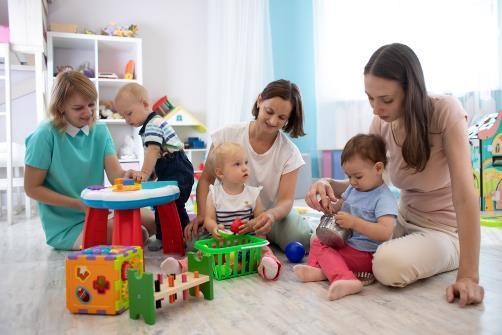Ideas for communicating better with parents and increasing engagement in your program
As a child care provider, you know that parental involvement in your program is important, but it can be challenging and seemingly impossible to inspire. Usually, there are a handful of parents who take on the bulk of the work. Many parents, however, do most of their interaction at pickup and drop off with a hurried “hello” and “goodbye.”
It’s easy to understand why. Parents are busier than ever these days, many of them working full time with multiple obligations. They may not understand why parental involvement in your program is so important to their child’s development. Or they simply don’t have the time to be as involved as others.
Research has shown clear benefits to parent participation in early childhood education. The most obvious is that by knowing what’s going on at child care, parents can continue the same habits and lessons at home. This has been proven to increase children’s discipline and focus, which means they are less likely to fall behind.
At the end of the day, it’s all about relationship building. Parents leave their children with you for extended periods of time. They need to be able to trust you and understand why their involvement matters. Here are some ideas for jump-starting participation and making it enjoyable for everyone.
Help parents get to know you
Oftentimes, you spend as many if not more hours with the children than the parents do. You are providing fundamental care and the early building blocks of education. The parents need to be able to trust you to do that. The best way to build that trust is to help them get to know you.
When new children come into the program, send parents a welcome packet with information about you, your style, and the child care center. This can include simple things like contact information, staff bios, and a calendar of events for parents. It’s simple, but it’s a start until you can talk to them more in-depth.
Hosting open houses several times a year gives you an opportunity to interact with parents, share what you’re teaching, and get their input. It’s a dedicated time that you have to talk to them face to face unlike drop off and pick up that are usually rushed and stressful. These interactions can make them more comfortable with you and give them a chance to hear about upcoming activities.
Try moving parent meetings to off-site locations. It can automatically help relax the conversation and put parents more at ease. Rent a room at a restaurant or have a barbecue at a local park. It’s a chance for parents to interact with you in a more laid back environment, and they can also get to know one another. Having friends in the same program can improve engagement as well.
Be a helpful resource to parents
You are a child care expert, which means you can provide parents with valuable information and insight. With the help of volunteers and outside sources, you can put together a series of classes and workshops for parents to learn new skills and improve their parenting abilities. Topics like first aid, social development, sleep behaviors, and positive playtime are great topics to cover. These should reflect things you’re teaching in your program so parents have a hands-on understanding and can continue the lessons at home.
The easiest way to reach parents is electronically. If they aren’t available to attend meetings and classes, they can review the materials you send them in their free time. Newsletters are a simple and easy way to let parents know what’s going on in the program. Accompanying this with a calendar of upcoming events will give them an outline of what to expect.
Being in the child care industry, you may come across helpful resources such as articles and videos that parents may not see. Include them in the newsletter or send them separately. You never know who you might help with this information.
Over-communicate with parents
Just because some parents don’t volunteer or attend events doesn’t mean they aren’t dedicated or interested in their child’s development. Updating them on their child’s progress and over-communicating makes them feel more involved. It also positions you as an organized and invested child care provider.
Many caregivers now communicate with parents throughout the day via text or email, usually with pictures and videos of their children. They send daily reports to update the parents on progress, behavior, and fun stories. Parents appreciate you taking the time to capture a video of their children, sending them a message or just doing a fun activity. They miss them, and it helps them feel more connected while they’re away.
Over communicating, events and volunteer opportunities are the only way to increase participation. You can’t expect parents to remember an activity calendar you sent in a newsletter three months ago. Whatever method you choose, keep reminding parents of upcoming events and meetings. With all they have going on in their lives, they may appreciate the extra boost.
Email and text are also great ways to conduct surveys. You can find out what parents think about their child’s development and your child care style. This is a great chance to understand engagement behaviors. Ask them why they aren’t involved and what could help change that. You might be surprised to find that a simple change in time or location of activities would increase attendance.
You’re all on the same team
If you’re looking to improve your communication with parents, there are a variety of platforms and apps available to help you. You can work faster, more efficiently, and in a way that will actually reach parents.
Parental involvement in your child care program isn’t just about helping you with activities, it’s about the development and progress of the children. When parents understand what their children are learning in child care, they can reinforce those lessons at home and even show their child real-world examples that you may not be able to provide.
Remember, you are working with parents to contribute to their children’s education. You’re on the same team. Start by building a foundation based on trust where parents can communicate with you openly and honestly. Share your own experiences as a parent and your goals for their child. When parents are on the same page with you, they will be more likely to take time to engage with the program.
The Virginia Infant & Toddler Specialist Network helps improve the quality of care for infants and toddlers through extensive resources, services, and education for caregivers. Learn more about how we can help you improve the standard of care.




